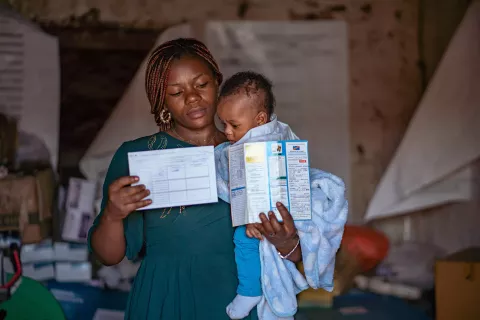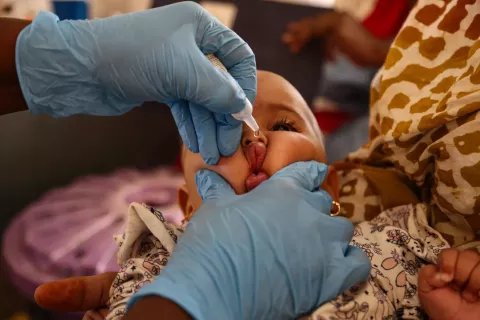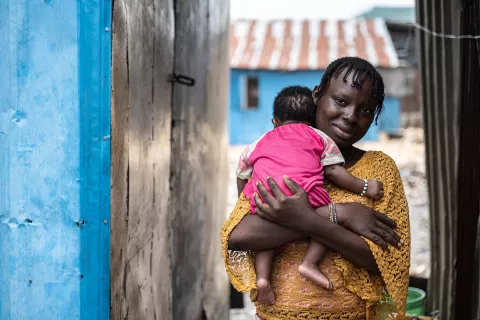A hope shattered by abduction, now restored by education
UNICEF support has been critical in assisting children like Abeo* to rebuild their lives

Borno state, NIGERIA - At birth, he lost his mother. At the age of seven, he lost his father.
A few years later, Abeo* was abducted by Boko Haram, confined in a barracks, imprisoned and denied an education.
“The armed men didn't want us to go to school and we were always monitored, life was not as free as before,” he says.
Abeo’s story is evidence of the horrors and some of the grave violations committed against children by non-state armed groups in the northeast of Nigeria, at the Southeast of the Borno state capital of Maiduguri.
Abeo recalls how their community came under attack by non-state armed groups. “No one could leave the community because it was controlled by the insurgents,” he recalls. “I saw them kill people who did not follow their rules and those who tried to escape. This scared me.”
A year later, the Nigerian Government armed forces recaptured his locality from the non-state armed groups, giving Abeo and his sister an opportunity to return to their hometown.
However, on arrival, Abeo was rounded up by the armed forces under the guise of being taken to school.
The promise of education was good news for Abeo. But instead of reporting to school, he was taken to a military barracks in Maiduguri for a whole year.
“There was so much suffering at the barracks”, Abeo said. “We were always cramped inside the room and you can’t do anything with hunger, heat and lack of freedom.”
The West and Central Africa region has the largest number of children verified by the United Nations as having been recruited and used by armed forces and non-state armed groups worldwide. Since 2005, almost one out of every two children (42,000 children) verified as recruited and used by armed forces and non-state armed groups globally was in the West and Central Africa region.
After a year in the barracks, Abeo's hopes of returning home were shattered when he was instead transported to a prison, where he stayed for four years. On release, Abeo was taken to the UNICEF-supported Borno State Transit Centre, opening a new chapter of his life.

When learning a skill, people should be patient and understand that the skills cannot be taken away from them.
Fast forward, a positive story emerges out of the losses Abeo suffered.
UNICEF partner organizations, Search for Common Ground and Goal Prime Organization, provided Abeo with psychosocial support and vocational training. Abeo was taught how to sew and given a sewing machine and clothing material after his training, opening his way to financial independence.
Today, Abeo earns at least 700 Naira per day (approximately USD 1.70), sewing facemasks and clothing. He wants to expand his business and continue with his education.
“When learning a skill, people should be patient and understand that the skills cannot be taken away from them,” he says.
Christopher Chinedumuije, Chief Executive Director and Chief of Programmes, GOAL Prime Organization Nigeria, says Abeo’s story shows that “every child has the capacity to become a solution.”
“If we don't support these kids today, when issues like this arise tomorrow, we'll have nobody to solve them.”
Abeo has registered for school and is saving some money to sit his Senior School Certificate Examination exams.
Christopher Chinedumuije says the UNICEF supported reintegration program has been critical in helping children associated with non-state armed groups rebuild their lives.
“The reintegration programme is fundamental to ensure that these kids have their lives back”, he emphasizes. “If these kids don't have their lives back, they remain vulnerable to possible recruitment.”
UNICEF and partners are continuing to provide care and protection for children living through conflict, advocating on their behalf and engaging with all parties to conflict to ensure their rights are upheld.
In addition to providing emergency and longer-term assistance to children, UNICEF and its partners have also trained governmental officials and parties to conflict on child protection and raised awareness with governments, communities and families on the risks facing children in armed conflict.
*name changed for protection




